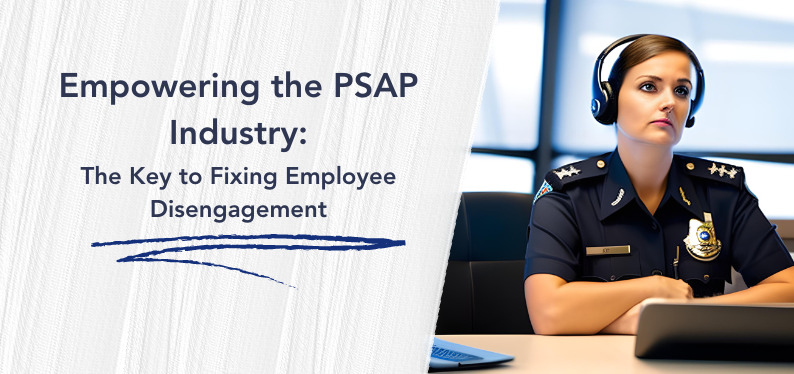The 911 Public Safety Answering Point (PSAP) industry is an integral part of emergency response services. Each day, operators in 911 dispatch centers manage countless calls, providing immediate assistance in times of crisis. Yet, maintaining such elevated levels of focus, empathy, and rapid decision-making can take a toll on these operators, leading to a widespread issue: employee disengagement.
According to the 2022 Gallup Workforce report, 60% of people feel emotionally detached at work, and 19% are downright miserable. Within the high-pressure, high-stakes environment of a PSAP, disengagement and discontentment can adversely affect the quality of service provided to callers in distress.
But there’s good news. The solution to this pervasive issue is not complex or unattainable. It is straightforward and achievable: better leaders in the workplace.
Managers in the PSAP industry need to step up as better listeners, coaches, and collaborators. They must strive to understand their operators’ challenges and concerns, supply constructive feedback and guidance, and work alongside their teams to create a supportive, positive work environment. Here is how:
1. Listening: Effective communication is a two-way street. Managers need to listen actively to their operators, understanding their struggles, ideas, and aspirations. This fosters an environment of respect and openness, where operators feel valued and heard.
2. Coaching: Good managers are not just supervisors but mentors. Helping their operators learn and grow, supplying regular training and constructive feedback. This not only equips operators with the skills to excel at their jobs but also shows the managers’ investment in their teams’ professional development.
3. Collaborating: A great manager collaborates with the team, not above it. Collaboration fosters a sense of unity and shared purpose, which can significantly improve team morale and engagement.
4. Recognition: Recognizing and appreciating operators for their hard work and dedication is crucial. A simple ‘thank you’ or a small token of appreciation can go a long way towards making operators feel valued and motivated.
5. Care: Managers need to make their operators feel genuinely cared for. This goes beyond professional support, extending to personal well-being. Offering wellness programs, mental health resources, and a supportive ear can help operators feel cared for as individuals, not just employees.
In such an environment, operators do not just survive—they thrive. They feel motivated, engaged, and valued, which directly translates into their work. Better service for callers, lower turnover rates, and a more positive work culture are the benefits that stem from better leadership.
In the PSAP industry, every call matters. But to truly ensure this, we need to remember that every operator matters, too. By nurturing better leaders in the workplace, we can combat employee disengagement, uplift our operators, and provide better service to those in need.
Because when it comes to transforming the PSAP industry, the real fix is simple: better leaders, for a better workplace.


Recent Comments